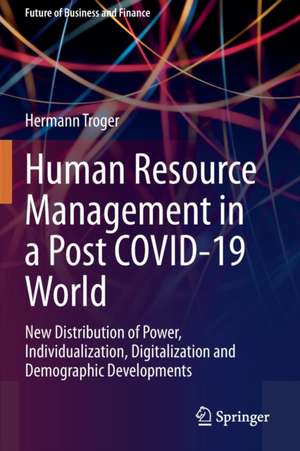Human Resource Management in a Post COVID-19 World: New Distribution of Power, Individualization, Digitalization and Demographic Developments: Future of Business and Finance
Autor Hermann Trogeren Limba Engleză Paperback – 4 mar 2022
The author emphasizes that dealing with the challenges of this extremely fragile world of work - currently exacerbated by the COVID-19 pandemic - must by no means be left solely in the hands of overburdened personnel managers. The contribution of the line manager or direct superior is becoming increasingly important. And it is only through close and clearly defined cooperation between the two that the opportunity for effective human resources management lies. This book aims to illustrate this process of division of labor in the individual phases of personnel management.
| Toate formatele și edițiile | Preț | Express |
|---|---|---|
| Paperback (1) | 449.90 lei 6-8 săpt. | |
| Springer International Publishing – 4 mar 2022 | 449.90 lei 6-8 săpt. | |
| Hardback (1) | 529.78 lei 6-8 săpt. | |
| Springer International Publishing – 3 mar 2021 | 529.78 lei 6-8 săpt. |
Din seria Future of Business and Finance
-
 Preț: 358.81 lei
Preț: 358.81 lei -
 Preț: 282.08 lei
Preț: 282.08 lei - 15%
 Preț: 587.72 lei
Preț: 587.72 lei - 15%
 Preț: 531.26 lei
Preț: 531.26 lei - 17%
 Preț: 523.23 lei
Preț: 523.23 lei - 15%
 Preț: 594.49 lei
Preț: 594.49 lei - 20%
 Preț: 568.42 lei
Preț: 568.42 lei -
 Preț: 309.42 lei
Preț: 309.42 lei -
 Preț: 403.59 lei
Preț: 403.59 lei -
 Preț: 397.17 lei
Preț: 397.17 lei -
 Preț: 349.97 lei
Preț: 349.97 lei - 17%
 Preț: 426.58 lei
Preț: 426.58 lei -
 Preț: 381.36 lei
Preț: 381.36 lei - 15%
 Preț: 590.95 lei
Preț: 590.95 lei - 17%
 Preț: 363.91 lei
Preț: 363.91 lei - 17%
 Preț: 427.41 lei
Preț: 427.41 lei - 17%
 Preț: 360.93 lei
Preț: 360.93 lei - 20%
 Preț: 568.81 lei
Preț: 568.81 lei - 17%
 Preț: 365.37 lei
Preț: 365.37 lei -
 Preț: 395.65 lei
Preț: 395.65 lei - 15%
 Preț: 531.26 lei
Preț: 531.26 lei -
 Preț: 357.35 lei
Preț: 357.35 lei -
 Preț: 383.93 lei
Preț: 383.93 lei - 17%
 Preț: 428.03 lei
Preț: 428.03 lei -
 Preț: 389.49 lei
Preț: 389.49 lei -
 Preț: 416.48 lei
Preț: 416.48 lei - 15%
 Preț: 532.70 lei
Preț: 532.70 lei - 15%
 Preț: 495.33 lei
Preț: 495.33 lei - 15%
 Preț: 585.08 lei
Preț: 585.08 lei -
 Preț: 446.85 lei
Preț: 446.85 lei - 15%
 Preț: 509.58 lei
Preț: 509.58 lei -
 Preț: 385.62 lei
Preț: 385.62 lei -
 Preț: 389.31 lei
Preț: 389.31 lei -
 Preț: 379.68 lei
Preț: 379.68 lei - 15%
 Preț: 533.85 lei
Preț: 533.85 lei -
 Preț: 377.95 lei
Preț: 377.95 lei -
 Preț: 393.74 lei
Preț: 393.74 lei - 15%
 Preț: 525.54 lei
Preț: 525.54 lei -
 Preț: 384.31 lei
Preț: 384.31 lei -
 Preț: 383.71 lei
Preț: 383.71 lei - 15%
 Preț: 585.26 lei
Preț: 585.26 lei - 15%
 Preț: 540.24 lei
Preț: 540.24 lei - 15%
 Preț: 537.14 lei
Preț: 537.14 lei - 15%
 Preț: 532.23 lei
Preț: 532.23 lei - 18%
 Preț: 948.92 lei
Preț: 948.92 lei
Preț: 449.90 lei
Nou
86.10€ • 89.38$ • 71.79£
Carte tipărită la comandă
Livrare economică 22 martie-05 aprilie
Specificații
ISBN-10: 303067472X
Pagini: 198
Ilustrații: XV, 198 p. 26 illus.
Dimensiuni: 155 x 235 x 16 mm
Greutate: 0.31 kg
Ediția:1st ed. 2021
Editura: Springer International Publishing
Colecția Springer
Seria Future of Business and Finance
Locul publicării:Cham, Switzerland
Cuprins
Notă biografică
Textul de pe ultima copertă
The author emphasizes that dealing with the challenges of this extremely fragile world of work - currently exacerbated by the COVID-19 pandemic - must by no means be left solely in the hands of overburdened personnel managers. The contribution of the line manager or direct superior is becoming increasingly important. And it is only through close and clearly defined cooperation between the two that the opportunity for effective human resources management lies. This book aims to illustrate this process of division of labor in the individual phases of personnel management.
Caracteristici
Descriere
This book presents a novel viewpoint in HR management: in addition to the macroeconomic factors (demographic development, industry 4.0, digitization, etc.) and its micro-political counterparts (shortage of skilled workers, an aging workforce, shortage of MINTs), personnel policy in the highly developed economic regions of the world can increasingly be seen from the third point of view, which is the ego-perspective. The complexity of the economic world 4.0 is manifesting itself for the employees in a working world of unlimited possibilities, offering almost limitless freedom of choice, especially for younger people. Due to this shift in the balance of power, the influence of the employers decreases and is often reduced to countering the pronounced self-confidence of the employees in asserting their expectations with corresponding company incentives.
The author emphasizes that dealing with the challenges of this extremely fragile world of work - currently exacerbated by the COVID-19 pandemic - must by no means be left solely in the hands of overburdened personnel managers. The contribution of the line manager or direct superior is becoming increasingly important. And it is only through close and clearly defined cooperation between the two that the opportunity for effective human resources management lies. This book aims to illustrate this process of division of labor in the individual phases of personnel management.
